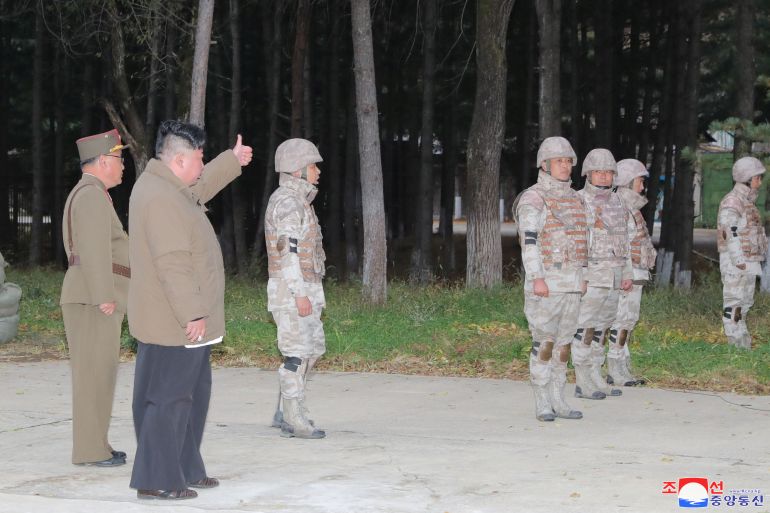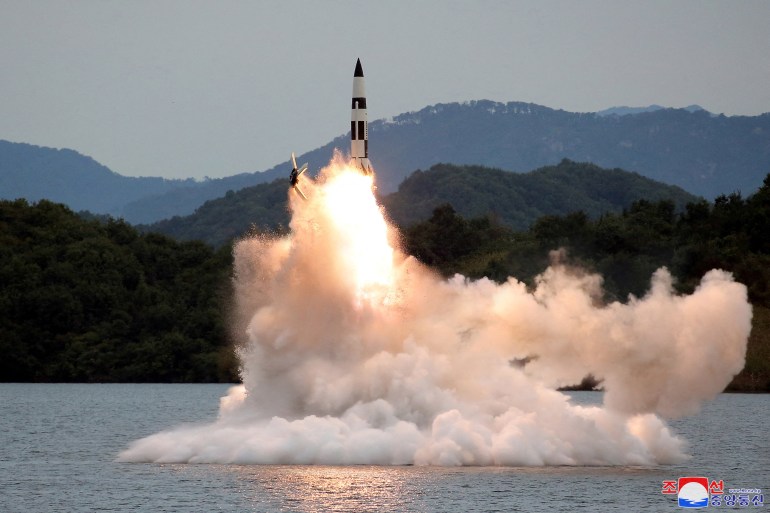North Korea fires missile after aircraft buzz South Korean border
Seoul imposes new sanctions amid heightened tension after a record number of weapons tests by the N Korea this year.

North Korea has launched a short-range ballistic missile towards its eastern waters after flying fighter jets near the border with South Korea, further ratcheting up tension on the peninsula from its unprecedented wave of weapons tests this year.
South Korea’s Joint Chiefs of Staff (JCS) said in a statement the missile was launched from the region around Pyongyang at 1:49am on Friday (16:49 GMT on Thursday).
Keep reading
list of 4 itemsWhat’s behind North Korea’s latest missile tests?
North Korea says tests a nuclear warning to South Korea, US
North Korea says it tested two nuclear-capable cruise missiles
It came hours after South Korea scrambled F-35 fighter jets and other aircraft when about 10 North Korean warplanes were detected as close as 12km (7 miles) to the border, the JCS said.
A similar incident took place last week, but this time the planes crossed a Seoul-set “reconnaissance line”, which triggers an automatic operational response.
South Korea’s National Security Council condemned North Korea for escalating tension, calling its moves a breach of a 2018 bilateral military pact that bans “hostile acts” in the border area.
Seoul imposed its first unilateral sanctions against Pyongyang in nearly five years, blacklisting 15 North Korean individuals and 16 institutions involved in missile development.
North Korea has carried out a record number of weapons launches in 2022, and leader Kim Jong Un has made the development of tactical nuclear weapons a priority.

Japanese Defence Minister Yasukazu Hamada condemned the latest weapons test and said the missile flew on an “irregular” trajectory — a possible reference to describe the KN-23, which is modelled on Russia’s Iskander missile.
“Whatever the intentions are, North Korea’s repeated ballistic missile launches are absolutely impermissible and we cannot overlook its substantial advancement of missile technology,” Hamada said. “North Korea’s series of actions pose threats to Japan, as well as the region and the international community, and are absolutely intolerable.”
‘Tactical nuclear’ drills
On Friday, the North Korean military said its latest actions were a response to a “provocative” South Korean artillery exercise near the border.
North Korea’s official KCNA news agency quoted its military as saying it took “strong military countermeasures” after South Korean artillery fire.
The Korean People’s Army “sends a stern warning to the South Korean military inciting military tension in the frontline area with reckless action”, said a statement.
With denuclearisation talks long stalled, and Ukraine-linked gridlock at the United Nations blocking any chance of new sanctions, Kim has doubled down on developing and testing his banned nuclear arsenal.
Officials in Seoul and Washington have been warning for months that Pyongyang is ready to conduct another nuclear test — which would be the country’s seventh, and the first in five years.
The missile launched on Friday travelled as far as 650km (404 miles) at a maximum altitude of 50km (31 miles) before landing in waters between the Korean Peninsula and Japan.
On Thursday, North Korea said it had tested two long-range cruise missiles, which fly at lower altitudes than ballistic missiles, making them harder to detect and intercept. Pyongyang is not technically banned by the UN from testing cruise missiles, but all ballistic missile launches violate sanctions.
Pyongyang said the missile launches were “tactical nuclear” drills that had been supervised by Kim and were a response to joint US-South Korean naval exercises.
The tests over the past two weeks were simulated nuclear attacks on key South Korean and US targets, North Korea said, adding that they were meant as a warning to Seoul and Washington over their exercises. The tests included a new intermediate-range missile that it flew over Japan and into the Pacific Ocean, the first such test in five years.
The launches are seen as an attempt by Kim to pressure its rivals to accept his country as a legitimate nuclear state and lift crippling economic sanctions.
Kim expressed “great satisfaction” with the recent tests, which he said showed the country’s nuclear combat forces were at “full preparedness for actual war”, KCNA reported.